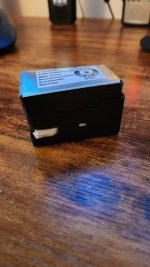Good input. As a first responder I can attest to commercial grade portable transceivers usage, especially in fire departments. Most portables sit for days before they are put into service, in a charger which is probably a smart charger where it charges and then goes into “conditioner mode”, either it stops charging and checks periodically or floats or simply shuts off altogether… my point is it’s not sitting in a charger constantly under full charging power… “frying”. True, some depts are busier than others but the gear is designed to accommodate either scenario and it's obvious the batteries are built to stringent standards, better than what Uniden is using, mil specs comes to mind. The obvious reason; These pieces of gear need to work when they are needed, no excuse's. I’ve had an iPhone that swelled but never became too hot to handle. Your TYT MD380 battery experience is the first I’ve heard of regarding ham equipment.
Again, my takeaway on Uniden’s offering is simply this, they asked for a battery that could be produced to meet Uniden’s needs without breaking the bank. It appears they had to make compromises in dependability. Make it safe so as not to hurt people (they haven’t burned anyone, exploded or caught fire) and save money using a cheaper design. On the up side, of all the batteries Uniden supplies for the SDS100 it’s my belief the quality control currently used has kept the failure rate very low. What are the percentage rates for failures? It must be well within acceptable limits otherwise Uniden would have offered a better battery.


